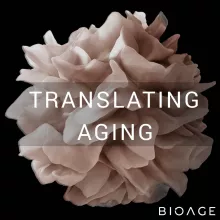Episode shownotes
On today’s episode is Dr. Jennifer Garrison, Professor at the Buck Institute for Research on Aging, and the Faculty Director of the Global Consortium for Reproductive Longevity and Equality (GCRLE), which is devoted to supporting breakthrough research on reproductive aging and women in science through funding, training, infrastructure, and collaborative intellectual networks.
Dr. Garrison explains that while there are plenty of scientists working on aging and plenty who are working on reproductive biology, there are precious few who are working at the interface of these two fields, which is what they are trying to build at the GCRLE. She shares her fascination with ovarian biology and how it fits into the broader context of longevity research, and details the issue of equality in terms of women having to plan their life choices around reproductive longevity in ways that men do not, as well as funding for women’s health being traditionally overlooked. Dr. Garrison answers questions about menopause across the animal kingdom, the link between reproductive span and lifespan in women, and the most important question we need to answer in order to truly understand ovarian aging.
Dr. Garrison describes the key role played by the brain in reproductive success, the need for better animal model systems to understand menopause, and how hormone replacement therapy can help mitigate the negative health consequences around menopause. You’ll also hear about the profound economic and societal impact of menopause globally, as well as Dr. Garrison’s goals for the future and dream outcomes she envisions for the Consortium as they continue their cutting-edge research on the causes of ovarian aging. To learn more about their important work, visit BuckInstitute.org/gcrle/.
Episode Highlights:
- The goal of the Global Consortium for Reproductive Longevity and Equality (CGRLE) is to extend the female reproductive span
- The Global Consortium began at the Buck Institute for Research on Aging through a generous donation from Nicole Shanahan and the Sergey Brin Family Foundation
- There are plenty of scientists working on aging and others who are working on reproductive biology, but precious few who are working at the interface of those two fields - that’s what they are trying to build
- The GCRLE has three arms: Funding; providing resources to build out the field; and building a network communications platform to foster dialogue and collaboration among researchers working on female reproductive aging
- They’ve also opened the world’s first ovarian biology core facility at the Buck Institute
- Ovaries are a very complex structure, and they age at a precocious rate - they’re considered geriatric by the time a woman is in her late 20s, early 30s
- Nicole Shanahan’s became involved with starting the CGRLE to find out what causes ovaries to decline in function so early
- Ovarian biology as it relates to reproductive longevity has been traditionally overlooked in terms of receiving funding
- Women’s health has been looked at as a subcategory of medicine
- Equality is a key piece to what they do - women need to plan their life choices around reproductive health in a way that men do not
- Menopause accelerates the aging process
- It is relatively rare in the animal kingdom - humans are one of the only species that go through menopause
- Women who experience menopause later in life also tend to live longer and have an enhanced ability to repair their DNA
- There is a clear link between reproductive span and lifespan in women
- The key question is, What is the cue that tells a woman’s ovaries to start declining in her 20s?
- The brain is a crucial player in reproductive success
- We need better animal...
